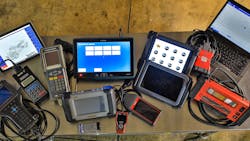Back in April, I attended the Equipment and Tool Institute’s ToolTech event. Each year, one of the event’s sessions is a shop owner’s panel, and one of the questions asked was how their shops are using OEM scan tools versus aftermarket. Though both have their place in a shop, I was fascinated to learn why technicians may lean one way or another.
OEM scan tools
For many of the shop owners, they view using an OEM scan tool as performing repairs at the next level.
“Ninety percent of the time, your generic [scan tool] will get the job done,” says Gene Morrill, owner of Certified Automotive Specialists. “Now, do we want to get the job done? Or do we want to do an OE level or factory reset the way it's made to do? Most of us here would want to do the higher level.”
Buckley’s Autocare owner, Greg Buckley, agreed with Morrill’s point and also noted that for his shop, they moved to OE because of the cost difference. It didn’t make sense to Buckley to be paying to have access to information for vehicles his shop wasn’t working on.
“For me,” Morrill says, “it was more of looking at and analyzing what tools I have, what I'm paying for, what I don't need, and when it came down to it, I felt that the OE was the much more viable option.”
Aftermarket scan tools
On the other hand, many of the shop owners agreed that ease of use has many of their technicians reaching for aftermarket scan tools over OE.
“There are some tools that are completely cost prohibitive or complex to use or we continue to have issues with,” notes Lucas Underwood, owner of L&M Performance. “My guys will not use those. They put them in the box. They leave them sitting there even if we have a subscription. If it's a pain in the butt to use, they're not going to use it.”
Lee Lizarraga, owner of ABC Autocare, also points out that if 90 percent of the jobs that they’re doing can be handled by an aftermarket scan tool why complicate things? Especially when overall, it’s really the technician’s choice what scan tool they want to use to complete a job.
“It's amazing how segmented that is where one technician may choose one [scan tool] versus another,” Lizarraga says. “And they can all talk about the pros and cons of each one. But not one technician is going to choose the same [scan tool] as the other one.”
About the Author
Emily Markham
Editor | PTEN and Professional Distributor
Emily Markham is the editor of Professional Tool & Equipment News (PTEN) and Professional Distributor magazines. She has been writing about the automotive aftermarket since 2019, after graduating from UW-La Crosse with a bachelor's degree in English. During her first three years with EndeavorB2B's Vehicle Service & Repair Group, Markham also wrote for Fleet Maintenance magazine.
Don't miss Markham's next article. Sign up for PTEN or Professional Distributor's weekly newsletter.

